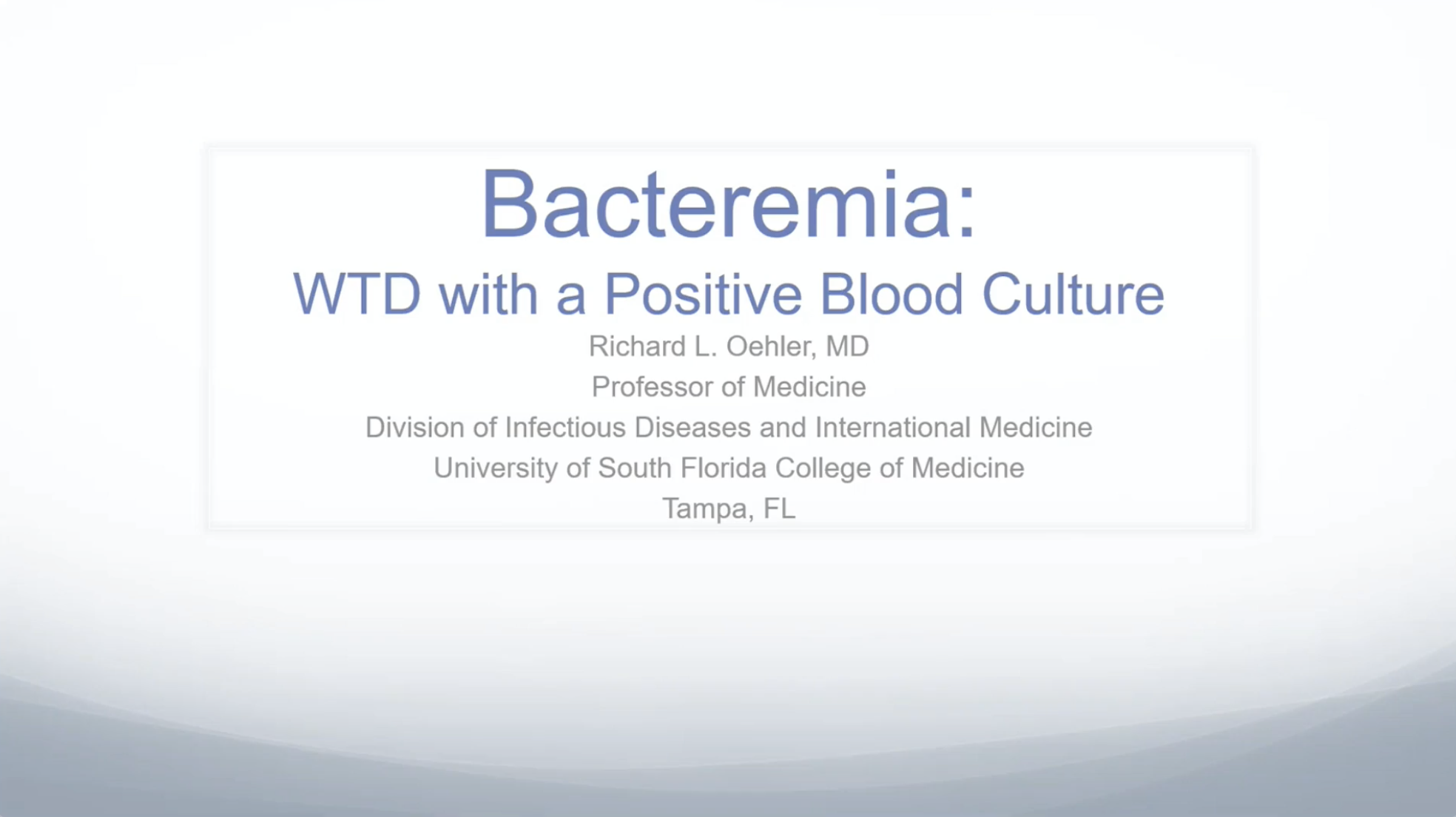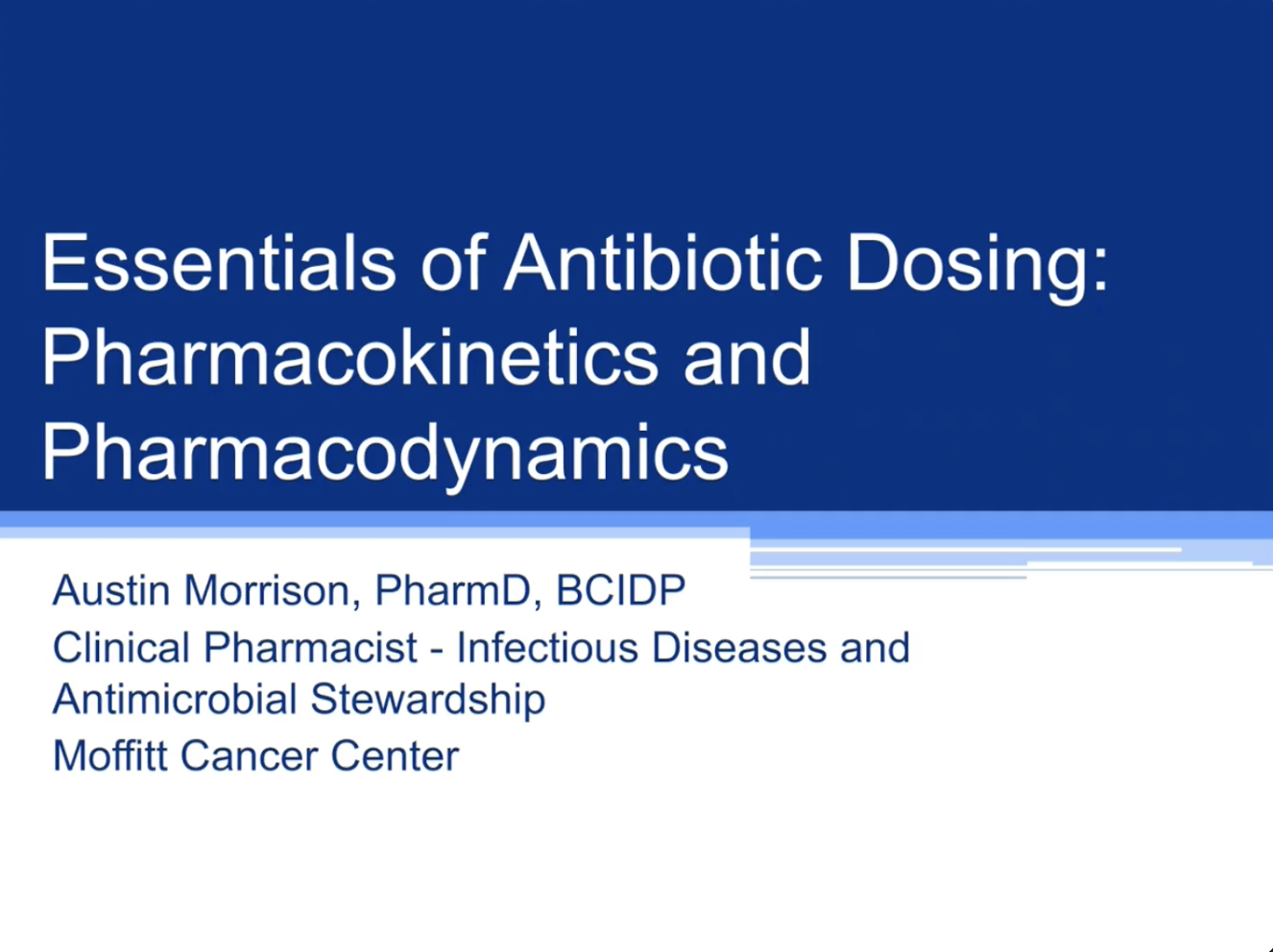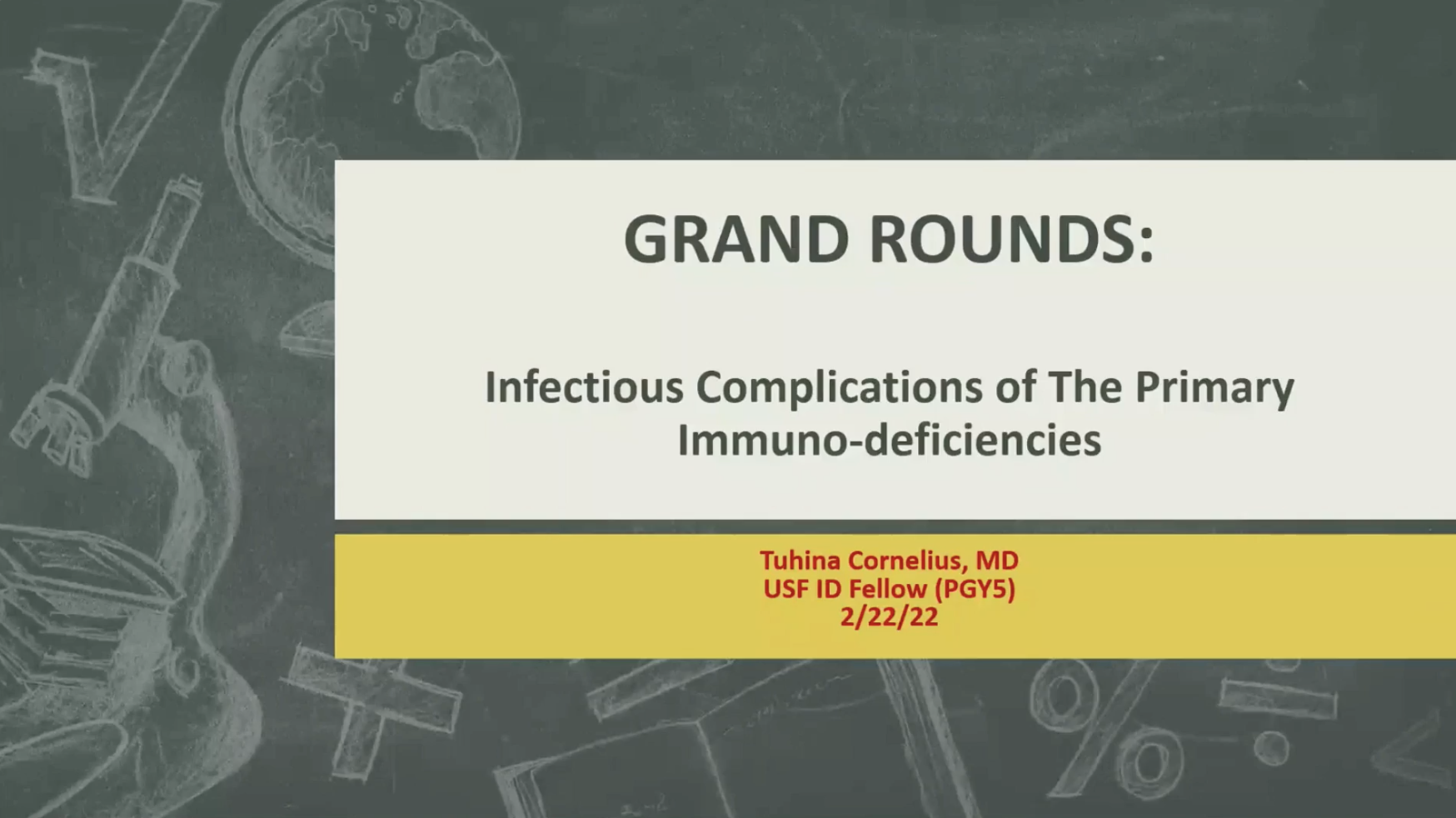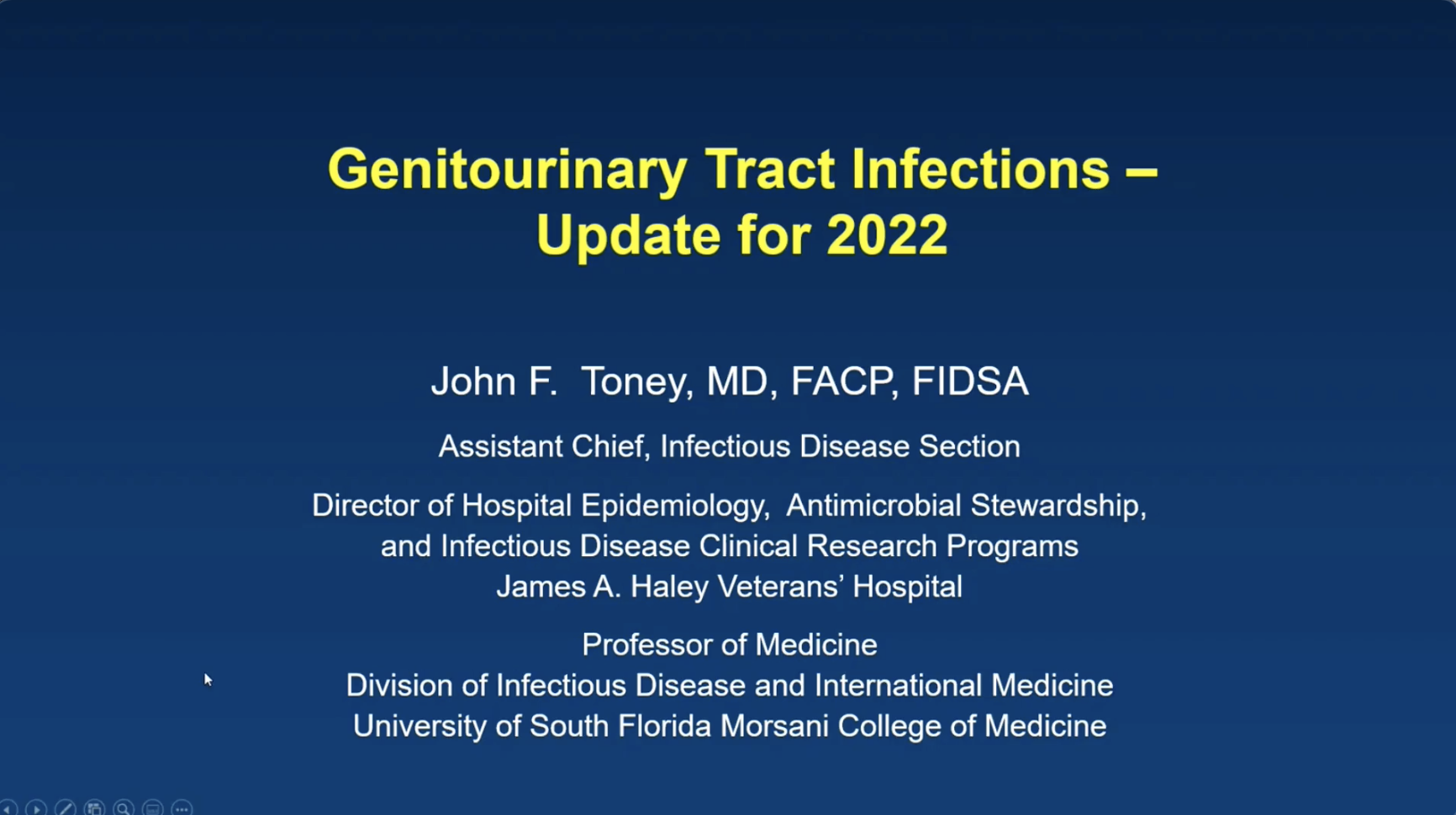Dr. Richard Oehler, Professor of Medicine at the Division of Infectious Diseases at the University of South Florida Morsani College of Medicine, presents a review of bacteremia. Dr. Oehler begins by reviewing the epidemiology, personal and institutional costs of bacteremia. He then discusses blood culture collection and how false positive blood cultures occur. Next, Dr. Oehler reviews automated blood culture systems and other related identification technology. The speaker then contrasts gram positive and gram negative bacteremia in general and by organism. The management of a positive blood culture with regard to treatment and source control is discussed. Lastly, ways to reduce the incidence of bacteremia are related.
Archives
Antibiotic Overview
Dr. Jose Montero, Professor and Director of the Antimicrobial Stewardship program at Tampa General Hospital, presents a basic review of antibiotic usage. Focusing on antibacterials, Dr. Montero differentiates the different antimicrobial classes, reviews the spectrum of activity and the common indications for different antibiotic agents. Dr. Montero also covers the most likely adverse reactions that are associated with specific antibiotic classes. Antibacterial agents covered include cephalosporins, other beta-lactams, carbapenems, aminoglycosides, glycopeptides, and beta-lactam-beta-lactamase inhibitors.
Essentials of Antibiotic Dosing: Pharmacokinetics and Pharmacodynamics
Austin Morrison, Infectious Diseases and Antimicrobial Stewardship Clinical Pharmacist at the Moffitt Cancer Center and Research Institute, presents a talk on the pharmacokinetic and pharmacodynamic principles associated with the optimal dosing of antimicrobial agents. Dr. Morrison begins by defining basic antimicrobial concepts, including absorption, distribution, metabolism, and excretion. He then compares and contrasts concentration-dependent versus time-dependent killing as it applies to different antimicrobial classes. Dr. Morrison then specifically singles out beta-lactams and time-dependent killing and the benefits of extended dosing strategies. He also discusses the significance of the AUC/MIC curve. Lastly, Dr. Morrison concludes by discussing antibiotic dosing in renal insufficiency and the ideal strategies for this group of patients.
HIV/AIDS: Optimism and New Directions for Ending the Epidemic
Dr. Jamie Morano, Associate Professor at the USF Morani College of Medicine, presents an overview of HIV/AIDS care in 2022. Dr. Morano begins by reviewing HIV epidemiology, including national regions of high HIV prevalence. She then discusses the “Test and Treat” approach to management. Antiretroviral treatment updates are presented, included the use of TAF and the new availability of longer acting injectable agents. HIV testing issues are also discussed, including testing barriers and HIV-related stigma. The concept of Undetectable=Untransmissable is also discussed. Lastly, Dr. Morano reviews PREP (preexposure prophylaxis) and nPEP (non-Occupational Post exposure Prophylaxis) for HIV.
Basic Immunology
Dr. Anthony Cannella, Infectious Diseases Clinician and Associate Professor with the Division of Infectious Diseases at the Morsani College of Medicine, presents a primer on basic immunology for clinicians. Dr. Cannella begins by drawing a distinction between innate and adaptive immunity. He then discusses the complement cascade, antimicrobial peptides, PAMPS, and DAMPS. Next, Dr. Cannella reviews individual components of the immune system, including neutrophils, eosinophils, macrophages, dendritic cells, and natural killer cells. Lastly, the remaining components of the immune system are covered, including B cells, immunoglobulins, and T cells and their function.
ID Management of Patients with Hematologic Malignancies and Stem Cell Transplants
Dr. Olga Klinkova covers essential information regarding the management of infectious complications of hematologic malignancies. Topics covered include the initial evaluation of patients, neutropenic fever, neutropenic enterocolitis, and antimicrobial prophylaxis. Next, Dr. Baluch discusses ID management of stem cell transplants, CAR-T therapy, and when it is necessary to administer antimicrobial prophylaxis in these patients. The talks are from an Infectious Diseases Bootcamp for ID Fellows recorded in August 2022.
Infectious Diseases Emergencies
Dr. Guy Handley, Assistant Professor with the Division of Infectious Diseases at the Morsani College of Medicine, presents his talk on infectious diseases emergencies. He discusses a variety of different syndromes, including bacterial meningitis, neutropenic fever, bacteremia, malaria, and viral hemorrhagic fevers. The information is presented in a Q&A format. This talk is Part of the “Infectious Diseases Bootcamp” series for USF infectious Diseases fellows presented in August, 2022.
Infectious Complications of the Primary Immunodeficiencies
Dr. Tuhina Cornelius, senior infectious diseases fellow at the University of South Florida College of Medicine, reviews the primary immunodeficiencies in this podcast presentation. The speaker begins by presenting the basics regarding the differences between cellular and humoral immunity. She then discusses specific B cell and T cell related immune deficits. Dr. Cornelius then goes on to describe disorders of phagocytosis, motility, complement, and other miscellaneous syndromes. Lastly, the management of these disorders is reviewed.
Tuberculosis: The Great Imitator
Dr. Suhel Sabunwala, Senior Infectious Diseases fellow at the University of South Florida College of Medicine, presents an update on Tuberculosis, a legacy disease of mankind rich in history and very much still highly prevalent in the modern world. Dr. Sabunwala begins by discussing the history of tuberculosis. He then transitions to the current status of TB disease and its impact in the US and across the globe. He further discusses how TB and COVID-19 have interacted during the pandemic. Lastly, the speaker discusses updates in treatment and global targets for eradication.
Genitourinary Tract Infections: Update for 2022
Dr. John Toney, Professor of Medicine at the University of South Florida Division of Infectious Diseases, presents an update on Genitourinary tract infections. He begins the presentation by discussing the many manifestations of UTIs, from asymptomatic bacteriuria to cystitis to pyelonephritis. He then differentiates acute uncomplicated and acute complicated cystitis. Next, he discusses acute pyelonephritis, its management and treatment options. More information on the assessment of asymptomatic bacteriuria is also presented. Next, Dr. Toney transitions to discussing updates in the the management and treatment of STI’s including Gonorrhea, Chlamydia, and Syphilis with an emphasis on the recent guidelines updates.









